
How to go about the process of hearing aid
selection
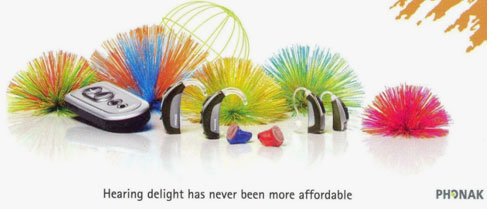
1) How Can You Be Sure Which Is The Right For You?
If you're interested in improving your hearing, you've probably heard a lot about Digital Hearing Instruments. How they amplify sounds more clearly and naturally than conventional hearing aids. Even that they can reduce the distraction of background noise. Digital hearing technology can do amazing things with the sounds you hear. This technology closely matches the way you hear, as well as your individual listening requirements.There can't be better designed hearing aid than to copy the system that has worked well for thousands of years. Digital hearing aid closely imitates the function of your inner ear.
2) Why Digital Hearing Aid?
Today, more of life's activities depend on accurate understanding and communication, with more interference and distractions. Digital Hearing Instruments with increased sophistication provides you with a significantly more effective hearing solution. Even better, digital Hearing Instruments unmatched flexibility lets us more precisely fine-tune its performance to complement your lifestyle needs and situations.3) Why do you need to wear Hearing Aids in Both Ears?
"One is less than Half" - Contrary to what you may think, one ear working less effectively than the other can have a significant impact on your daily activities. Hearing with one ear is like trying to see with one eye - it's possible, but not as effective."Nature Has A Way With Two" Like two legs, two wings, and two eyes nature has equipped the animal kingdom with a balanced pair of ears for reasons very important to their existence.
"Now that's what is called using your head!" Although our ears are certainly vital, our sense of 'hearing' actually occurs in between. Taking the input from both ears, the 'built - in signal processor' known as your brain blends these signals into a single sound "picture". To enjoy true balanced sound perception, BOTH ears must be functioning evenly. Without such equality, our brain presents us with incomplete information. To prevent this, your hearing professional may recommended you to wear two hearing aids. Our two ear working together give us the ability to "cut through" or isolate one specific sound over others.
"Localization" Correcting this difference can be important to your safety. Balanced hearing is vital to our ability to locate where a sound is coming from. Our brain instinctively locates a sound source by measuring the tiny differences in duration and intensity between each ear.
"Relaxing, Stress- Less Hearing" With both ears providing even input, less amplification may be required to achieve a comfortable listening level. And you don't need to worry about always getting your 'good ear' turned towards sounds.
4) Psychological Consequences of hearing loss
Some people can develop emotional or social difficulties due to their hearing loss. The inability to understand what is being said can lead to isolation, loneliness or depression. It can therefore mean a great deal if the people around them are supportive and encourage them to seek professional advice if necessary.Some people with a hearing loss struggle with a feeling of embarrassment if they misunderstand what is being said, or respond inappropriately. Your support and understanding in such cases can make a big difference. People with hearing difficulties often spend a great deal of their energy just in concentrating on listening, which can lead to tiredness and stress. So it is important that others are equally understanding, for example colleagues and management at their workplace.
5) Personal Hearing Evaluation Score Sheet
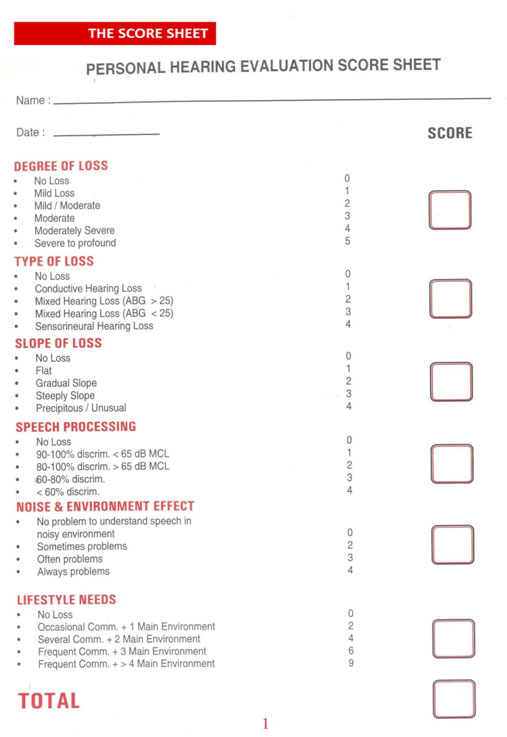
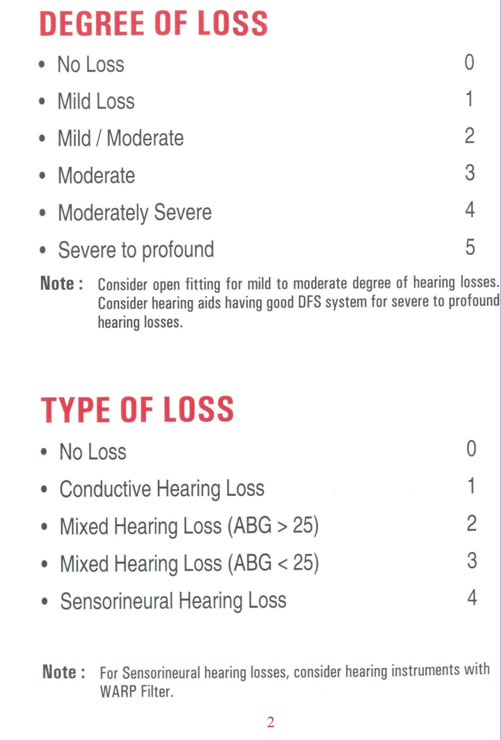
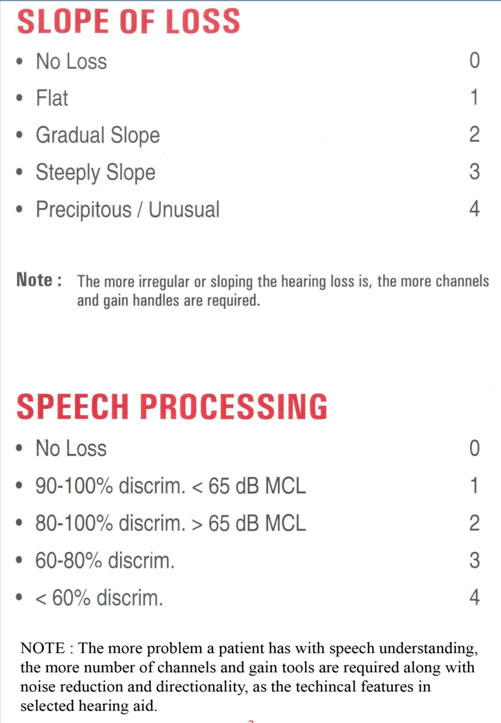
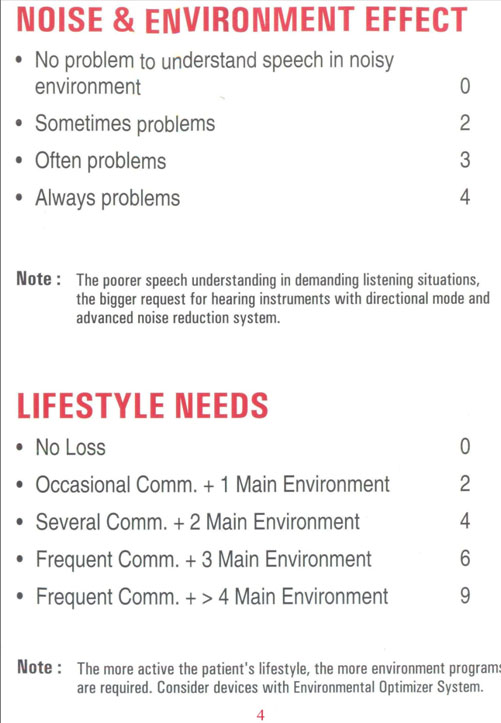
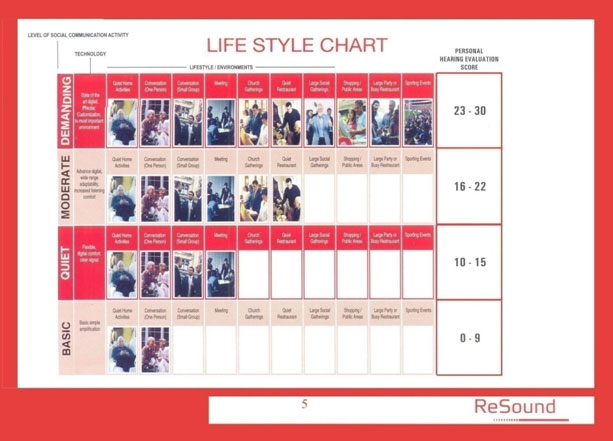
6) Missing areas in understanding the problem of Hearing Loss – observed during past 35 years of my experience in the field
Sooner the better – Do not let auditory cells of your brain become ‘DORMANT’ by ‘un-use’Two Ears are better than one – Must for better ‘Speech understanding/ clarity’ & 3D of sound
Selection of the instruments - Save yourself from getting dominated by lure of Discounts - Doctor Shopping, Heresy
Proper fitting of hearing aid – Right choice of Clinic, Expertise, Rapport with Audiologist, Specific observations
Educating the hearing aid users – Realistic expectations
The way the specs are for your eyes, hearing aids are for ears.
7) Steps To Follow for Selection of Hearing Aids
- Cosmetic Classification(performance of all same)
- Technical Classification(based on the daily need & exposure to various environment ) eg: theatre, traffic, restaurant
- Economic Classification( Consider ambient noise level of the environment )Entry, Basic, Advance
Points to note while selecting a Hearing Aid Gispenser
-
RCI 1972 ACT 
Only Audiologists can dispense Hearing Aids. BE AWARE 
Of fraudulent practice.
(T V, Railway Station, Home visits Pharmaceutical shops etc).MYTH 
1) Trying to hide hearing loss= trying to hide own teeth.
2) Sound Treated RoomIMPROVES 
Quality of life
Social Life-Relations
Mis-communications - Choose an Audiologist's Clinic that offers 2-3 Co.’s Instruments to select from.
- Audiologist must have sufficient time for counseling & answer all your questions on technology, care & maintenance.
- Expert audiologist should be able to give most comfortable fitting by fine tuning the advance H.A.
- Minimum 3 sessions/1st month required for best tuning
- Advance H.A.s of all top 10 Co's are good BUT price varies so compare price Vs technology.
- Every Co. has their Domain ( For E.g.: Fitting range of H.A.Vs Cosmetic Look)
8) Top 10 Hearing Aid Manufacturing Co.
| 1) Starkey - U.S. | 6) Oticon - Denmark |
| 2) Unitron - Canada | 7) Widex - Denmark |
| 3) Phonak - Switzerland | 8) Resound - Denmark |
| 4) Siemens - Singapore | 9) Rexton - Singapore (Siemens) |
| 5) Beltone - U.S. | 10)Arphi, Elkon, Alps - India |
Top 10 Manufacturers Vs a Vs A Audiology Clinic
- Advance Instruments of all these Co's are good
- Every Co. has their Domain ( For E.g.: Fitting range of H A)
- Choose Clinic that offers 2-3 Co.’s Instruments to select from
- Choose an audiologist who gives sufficient time to do counseling & answer your questions regarding care & maintenance of hearing aid / technology
- Expert audiologist should be able to give most comfortable fitting by fine tuning the advance Hearing Aid












